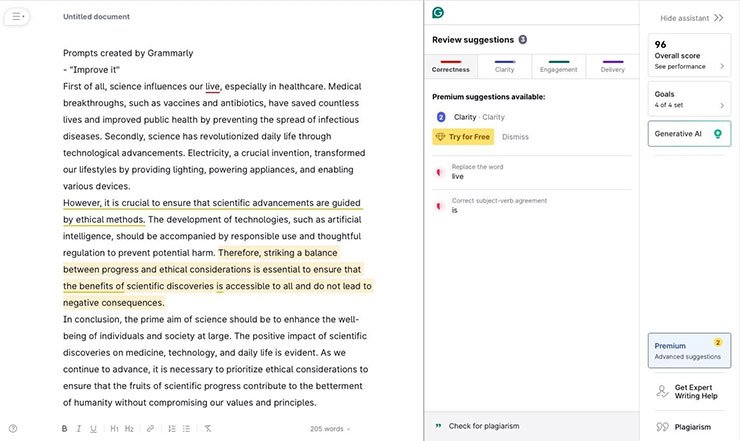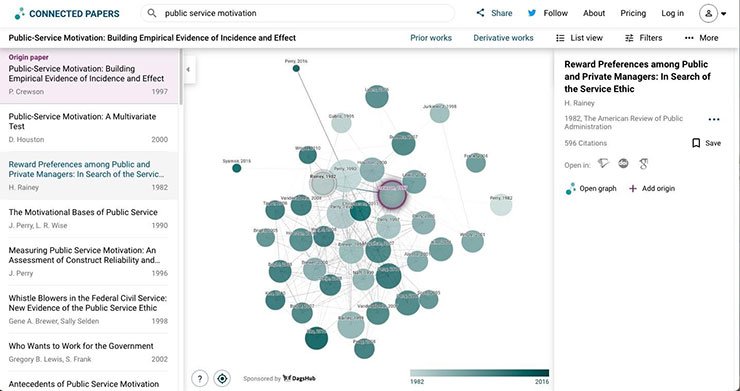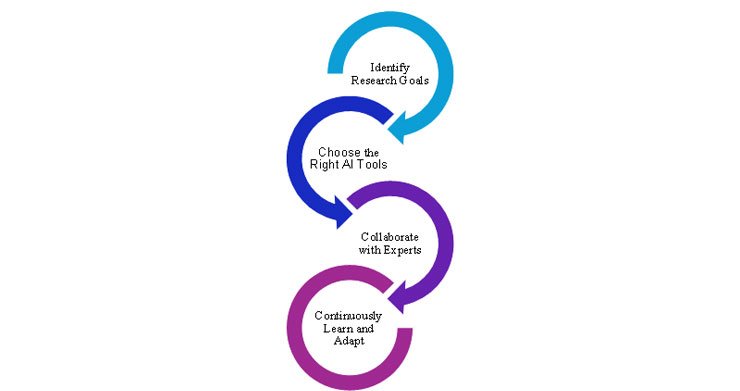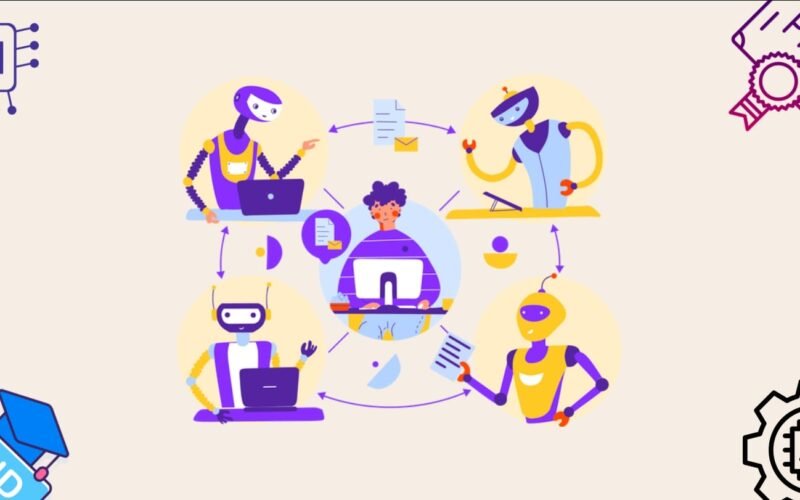Are you a doctoral student who aspires to conquer the academic world?
Table Of Content
- Why AI for PhD Students?
- The Best AI Tools for PhD Students
- Grammarly
- Ref-N-Write
- Paperpile
- Paper Digest
- Connected Papers
- SciSpace
- Elicit
- Consensus
- PaperPal
- Benefits of AI for PhD Students
- Time-Saving
- Increased Accuracy
- Enhanced Creativity
- Improved Collaboration
- Challenges of Using AI in Research
- Data Privacy and Security
- Bias in AI
- Lack of Understanding and Training
- How to Incorporate AI into PhD Research
- Identify Research Goals
- Choose the Right AI Tools
- Collaborate with Experts
- Continuously Learn and Adapt
- To Wrap-Up
- FAQs
- 1. Are these AI tools free to use?
- 2. Can AI tools replace human intelligence in academic research?
- 3. Can AI tools help PhD students with literature review?
In this digital era, opportunities brought by the synergy between academia and artificial intelligence (AI) are more promising than ever.
Join us on a journey through the best AI tools created to improve PhD students’ academic work.
Why AI for PhD Students?
Before delving into the realm of academic AI tools, let’s pause for a moment to ponder:
why AI for PhD students? The answer lies in the ever-expanding landscape of research and scholarly endeavors.
AI has emerged as a game-changer, offering unparalleled assistance in various aspects of academic life, from data analysis to literature review and beyond.(You May Also Like: AI Websites for Research Papers)
Here’s why AI is essential for your research journey:
- Efficiency: AI automates repetitive tasks such as data analysis, allowing you to focus on the creative aspects of your research.
- Precision: AI algorithms can process large data sets with exceptional precision, so the margin of errors is significantly small and the credibility of your results enhanced.
- Insights: AI-powered tools can uncover hidden patterns and trends in data, providing valuable insights that may not be apparent through traditional analysis methods.
- Productivity: By streamlining the research workflow, AI enables you to do more in less amount of time, hence making you more productive and yielding greater output.
- Innovation: AI fosters innovation by enabling you to explore new research avenues and experiment with advanced technologies in your field.
The Best AI Tools for PhD Students
Grammarly
Overview:
Writing and editing research papers can be daunting for PhD students. Grammarly, an AI-powered writing assistant, is here to save the day. It seamlessly integrates with your word processor to provide real-time grammar, spelling, punctuation, and style suggestions.
Key Features:
- Real-time grammar and spell checking.
- Style suggestions to enhance clarity and coherence.
- Plagiarism checker ensures proper citation of sources.
Benefits:
- Ensures error-free and well-written papers.
- Saves time on manual proofreading and editing.
- Improves overall writing skills and academic professionalism.

Ref-N-Write
Overview:
Ref-N-Write acts as a virtual librarian for PhD students, easing the burden of citation management and text paraphrasing.
Key Features:
- Citation generation for various reference styles.
- Text paraphrasing to avoid plagiarism.
- Organizes references efficiently.
Benefits:
- Streamlines literature review and citation processes.
- Enhances academic integrity by promoting proper referencing.
- Saves time on manual citation formatting and paraphrasing.
You May Also Like: Top Free AI Tools for Research Paper Understanding
Paperpile
Overview:
Paperpile is a cloud-based PDF powerhouse designed to simplify the management and citation of research papers.
Key Features:
- Seamless integration with Google Scholar and Google Docs.
- One-click import, organize, and cite functionality.
- Cloud-based storage for easy access to references.
Benefits:
- Eliminates the hassle of managing PDFs and citations manually.
- Enhances collaboration and productivity with cloud-based accessibility.
- Streamlines the research workflow by centralizing reference management.
Paper Digest
Overview:
Paper Digest uses AI algorithms to deliver personalized digests of scholarly articles, keeping PhD students updated on the latest research in their field.
Key Features:
- Personalized digests based on research interests.
- Automated delivery straight to your inbox.
- Saves time on manual literature search and review.
Benefits:
- Stay informed about recent developments and trends in your field.
- Easily digestible summaries facilitate quick understanding and decision-making.
- Helps manage information overload by prioritizing relevant research articles.
Connected Papers
Overview:
Connected Papers is a visual tool that maps out the interconnectedness of research papers, helping PhD students navigate academic literature with ease.
Key Features:
- Intuitive visual interface for exploring research connections.
- Identifies seminal works and related studies.
- Provides fresh perspectives on research topics.
Benefits:
- Facilitates literature review and research synthesis.
- Unearths hidden connections and insights.
- Enhances understanding of the research landscape and potential research directions.

SciSpace
With its AI-driven project management features, SciSpace streamlines research workflows and enhances productivity, allowing you to focus on what matters most—your research.
Elicit
Say goodbye to tedious literature reviews with Elicit, your AI-powered assistant for extracting insights from research articles.
By leveraging natural language processing (NLP) algorithms, Elicit automates the process of extracting key insights, saving you valuable time and effort. Dive deeper into the literature and uncover hidden gems for your research.
Consensus
Experience a revolution in peer review with Consensus—a platform that streamlines the peer review process and ensures transparency and rigor.
Submit your research manuscripts to Consensus for peer review, where AI algorithms assess the quality and credibility of submissions. Receive constructive feedback from experts in your field and enhance the validity of your research.
PaperPal
Submit your research papers to PaperPal for thorough proofreading and editing, ensuring clarity, coherence, and adherence to academic standards. Elevate the quality of your scholarly work and achieve academic success with PaperPal by your side.
| AI Tool | Features | Benefits | Price | Availability |
| Grammarly | Real-time grammar and spell checking | Improves writing clarity and coherence | Free/Premium | Web, Desktop, Mobile |
| Ref-N-Write | Citation generation, text paraphrasing | Streamlines citation management and literature review | Paid | Web |
| Paperpile | Reference management within Google Docs | Simplifies organization and formatting of references | Paid | Web |
| Paper Digest | Personalized digests of scholarly articles | Keeps researchers updated on latest research | Free | Web |
| Connected Papers | Visual maps of research papers | Facilitates exploration of academic literature networks | Free | Web |
| SciSpace | Research interest analysis, networking | Connects researchers with similar interests | Free | Web |
| Elicit | Research topic suggestion based on literature | Sparks creativity and idea generation | Free | Web |
| Consensus | Opinion aggregation and feedback | Facilitates decision-making and consensus-building | Paid | Web |
| PaperPal | AI-driven peer review and feedback | Enhances research quality and rigor | Paid | Web |
Benefits of AI for PhD Students
Let’s dive in and explore the myriad benefits that AI brings to the table. From saving time to boosting accuracy and enhancing creativity and collaboration, AI is a game-changer for researchers worldwide:
Time-Saving
AI automates repetitive tasks, such as data collection and analysis, freeing up valuable time for PhD students to focus on critical thinking and innovation.
Increased Accuracy
By minimizing human error and bias, AI enhances the accuracy and reliability of research findings, bolstering the credibility of scholarly work.
Enhanced Creativity
AI tools inspire creativity by offering novel perspectives, generating innovative ideas, and facilitating interdisciplinary collaboration.
Improved Collaboration
Virtual collaboration platforms powered by AI foster interdisciplinary partnerships, transcending geographical boundaries and facilitating knowledge exchange among researchers worldwide.
Challenges of Using AI in Research
As exciting as the prospects of AI are for revolutionising research, it’s not all smooth sailing. Alongside its myriad benefits, incorporating artificial intelligence (AI) into academic pursuits comes with its fair share of challenges.
From navigating concerns surrounding data privacy and security to grappling with the nuances of bias in AI algorithms, researchers must tread carefully in this rapidly evolving landscape.
Moreover, the complexity of AI technologies presents a formidable hurdle for PhD students, who may lack the requisite understanding and training. Let’s delve into these challenges and explore how researchers navigate AI’s intricate terrain in research:
Data Privacy and Security
Concerns about data privacy and security loom large in the AI landscape, necessitating robust safeguards to protect sensitive research data from unauthorized access or misuse.
Bias in AI
AI algorithms are susceptible to bias inherent in training data, raising ethical concerns about fairness, transparency, and accountability in research outcomes.
Lack of Understanding and Training
The complex nature of AI technologies demands interdisciplinary expertise and specialized training—a hurdle for PhD students lacking prior experience in machine learning or data science.
How to Incorporate AI into PhD Research
Identify Research Goals
Before diving into AI integration, it’s essential to establish clear research objectives.
Consider how AI can optimize data analysis, automate tasks, and extract insights from large datasets. Take the time to reflect on your academic pursuits and pinpoint areas where AI can seamlessly integrate.

Choose the Right AI Tools
Navigate through the sea of AI tools by evaluating functionality, usability, and compatibility.
Select tools such as machine learning algorithms and data visualization platforms that align with your research requirements. Conduct thorough research to ensure the chosen tools can augment your methodologies and accelerate progress towards your research goals.
Collaborate with Experts
Forge partnerships with AI experts, faculty mentors, and interdisciplinary collaborators to navigate technical challenges and leverage their expertise.
Engage in meaningful discussions, seek guidance on AI implementation, and explore innovative solutions together. Collaboration cultivates innovation and maximizes the impact of AI in your research endeavors.
Continuously Learn and Adapt
Continuous learning is key to staying ahead of the curve.
Participate in training programs, attend workshops, and explore online resources to expand your skill set and deepen your understanding of AI technologies. Embrace a culture of lifelong learning to adapt to AI’s rapid advancements and harness its full potential in your academic pursuits.
To Wrap-Up
As AI continues to reshape the landscape of academia, PhD students stand at the forefront of innovation, poised to harness the transformative power of AI to advance knowledge and drive meaningful change.
By embracing AI tools and methodologies, scholars can embark on a journey of discovery, creativity, and intellectual exploration, ushering in a new era of scholarly excellence.
FAQs
1. Are these AI tools free to use?
Yes, most of the mentioned AI tools offer free versions with limited features. However, premium subscriptions are available for users seeking advanced functionalities.
2. Can AI tools replace human intelligence in academic research?
While AI tools can augment and expedite various aspects of academic research, they cannot replace human ingenuity and critical thinking. Ultimately, the role of AI is to complement—not supplant—the intellectual prowess of researchers.
3. Can AI tools help PhD students with literature review?
Absolutely! AI tools like Mendeley and Zotero streamline the literature review process by enabling users to organize, annotate, and cite research sources efficiently. Additionally, AI-powered search algorithms facilitate the discovery of relevant scholarly articles and papers.








No Comment! Be the first one.